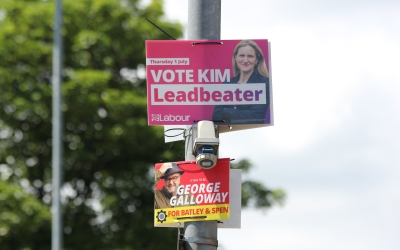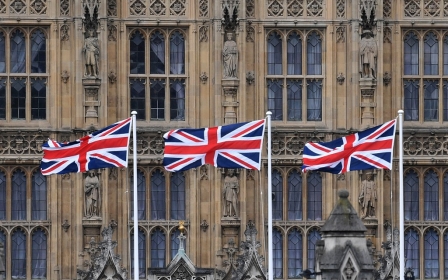Labour Islamophobia: How a 'party for all' became a party for none

Over the past four general elections, the British electorate has sent messages to the Labour Party. Media and political commentators have cited a “need to listen”. Now, as Muslim voters in Batley and Spen send out a similar message, some have pointed to antisemitism as their motivation.
In the Mail On Sunday, columnist Dan Hodges quoted an anonymous senior Labour official who, it seemed, wanted to get the excuses in early by citing leader Keir Starmer’s work on antisemitism as the reason why Muslims in Batley and Spen didn’t want to vote Labour.
Much of the commentary on Muslims in Batley and Spen overlooks the concerns around issues of class, poverty and inequality in favour of a 'clash of civilisations' lens
With the narrative set, a news article in the same paper then cited the Jewish heritage of Starmer’s wife as being among the reasons for Muslim disaffection. It is not clear who exactly gave this as a reason, or how many voters are even aware or care about the heritage of Starmer’s wife. But that wasn’t the point.
Coverage of Muslim communities often involves cherry-picking unverified and unattributable statements and messages that fit certain narratives. This then allows for sections of the British media to support racist stereotypes about Muslims, while absolving media and political power brokers from having to listen to Muslims and their concerns.
The Muslims of Batley know this all too well, having been derided as zealots and extremists for protesting against schoolteachers subjecting their children to racist caricatures in the name of “free speech”. A report on the furore vindicated the parents; it was clear that the media was the real mob outside the school gates.
New MEE newsletter: Jerusalem Dispatch
Sign up to get the latest insights and analysis on Israel-Palestine, alongside Turkey Unpacked and other MEE newsletters
Castigated as extremists
This is not the first time that Muslims making their voices heard on civil matters have been attacked. In reporting on the protests outside Birmingham primary schools opposing LGBT education, the media dredged up the fake Trojan Horse controversy that occurred five years earlier, while omitting many of the more concerning details of what Muslim children faced.
Many Labour politicians from the centre-right of the party took umbrage at parents and their supporters. This nexus of Labour politicians and media demonisation of Muslim communities has continued in Batley and Spen.
This is why many Muslims see in Starmer a type of media-cowed politician, who instead of fighting in their corner will do anything to steer clear of their issues - and if need be, employ the tropes regularly aimed at them.
As for the “tough on antisemitism” line within the Labour Party, Muslim voters have a recent charge sheet by which they can question just how aligned with their interests a Starmer-led Labour really is. Hesitant to condemn the murder of Palestinians by Israel, backing out of an iftar dinner because an organiser had boycotted Israeli dates, and speaking at an event organised by pro-Israel groups on an international Palestine solidarity day, Starmer does not appear to be tough on antisemitism, but rather tough on any support for Palestine.
It is not only Palestine or foreign policy that explain why many Muslim voters no longer see any hope in Labour. Sizeable Muslim populations in former “red wall” constituencies, like other voters, might simply have tired of Labour’s bureaucratic tendencies, the deprivation of their towns, and Labour’s inability to mount a credible opposition to the Conservatives, even as the ruling party dishes out large contracts to cronies.
As the journalist Basit Mahmood has observed, much of the commentary on Muslims in Batley and Spen overlooks the concerns around issues of class, poverty and inequality in favour of a "clash of civilisations" lens.
In addition, Labour has failed to tackle serious cases of Islamophobia. A recent poll for the Labour Muslim Network found that the party’s support among Muslims suffered a net drop of 12 percent over the past year. Starmer’s personal ratings among Muslims also dropped, suggesting that both the man and the machine are problematic.
Right-wing tropes
Yet, these perfectly logical explanations do not fit the purpose of Britain’s right-wing media. Nuance and analysis are inconvenient for tropes. Boosted by research from pro-Zionist and neo-conservative think tanks, the “Muslim antisemite” is a growing feature of media coverage, on everything from immigration, to Palestine, to local politics.
To sustain this argument, significant historical revisionism has also been employed, with polemics about the Prophet Muhammad’s expulsion of Jewish tribes as evidence for a uniquely Islamic antisemitism. What isn’t mentioned is that it wasn’t the Jewishness of those tribes, but their breaking of treaties and siding with the city’s enemies that bought about their downfall.
Maybe then, space would be freed up for a party that genuinely fights for their interests, and against those in the media who would target them
Such revisionism had a more modern incarnation in recent times, when former Israeli Prime Minister Benjamin Netanyahu chose to lay blame for the Holocaust at the feet of the former mufti of Jerusalem, Haj Amin al-Husseini. Such mangling of the truth doesn’t seem so absurd in the Trump-Johnson era, but it does point to who Zionists and others on the right would prefer to weaponise antisemitism against.
Aiming to be a party for all, Labour has in recent times danced to this narrative, while failing to tackle the Islamophobic elements in its ranks. In doing so, it is fast becoming a party for none. Starmer has responded to the concerns of Muslims voters through a letter pledging not to take the votes of Muslims for granted.
Yet evidence on the ground suggests it's too little too late.
In 2010, after more than a decade of New Labour domination, journalist Peter Hitchens encouraged his readers to abandon the Conservative Party and sound the death knell for what had become an organisation shorn of genuinely conservative values.
In a similar vein, Muslim voters may now have an opportunity to extinguish any faint hope of a Labour revival. They should seize it. Maybe then, space would be freed up for a party that genuinely fights for their interests, and against those in the media who would target them.
The views expressed in this article belong to the author and do not necessarily reflect the editorial policy of Middle East Eye.
Middle East Eye delivers independent and unrivalled coverage and analysis of the Middle East, North Africa and beyond. To learn more about republishing this content and the associated fees, please fill out this form. More about MEE can be found here.






